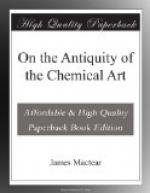Produced by Louise Hope, R. Cedron and the Online Distributed Proofreading Team at http://www.pgdp.net
[Transcriber’s Note: Typographical errors are listed at the end of the file. Misspelled Greek names were treated as errors; others are noted but not changed.]
* * * * *
President’s Opening Address to Chemical Section.
On the antiquity
of
the chemical art.
By James Mactear, F.C.S., F.C.I.
THE PRESIDENT’S OPENING ADDRESS TO THE CHEMICAL SECTION.
On the Antiquity of the Chemical Art. By James
Mactear,
F.C.S., F.C.I., Member of the International
Jury,
Paris, 1878, and Medalist of the Society
of Arts.
[Read before the Section, December 8th, 1879.]
The study of the History of Chemistry as an art, or as a science, is one which possesses peculiar fascination for its votaries. It has been the subject of deep research and much discussion, much has been written upon the subject, and many theories have been broached to account for its origin. We have had laid before us by Professor Ferguson, in his papers on this subject of Chemical History, very clearly and fully the generally-accepted position as regards the origin of the science, and in the last of these papers, entitled “Eleven Centuries of Chemistry,” he deals with the subject in a most complete manner, tracing back through its various mutations the development of the science to the time of Geber, in or about the year A.D. 778.
Of Geber, as a chemist, Professor Ferguson writes, “He was the first—because, although he himself speaks of the ancients, meaning thereby his forerunners, nothing is known of these older chemists.”
Rodwell, in his “Birth of Chemistry,” after a careful examination of the question, comes to the conclusion that, “in spite of all that has been written on the subject, there is no good evidence to prove that alchemy and chemistry did not originate in Arabia not long prior to the eighth century, A.D.,” bringing us again to the times of Geber.
He is not alone in this opinion, and it seems to be generally accepted that chemistry originated in the Arabian schools about this period.
In dealing with the question of the antiquity of chemical art, it has been too much the habit to look at the question with a view of discovering when and who it was that first brought forth, fully clothed as a science, the art of chemistry.
Let us look at the definition of the science given by Boerhaeve, about 1732. He describes chemistry as “an art which teaches the manner of performing certain physical operations, whereby bodies cognizable to the senses, or capable of being rendered cognizable, and of being contained in vessels, are so changed by means of proper instruments as to produce certain determinate effects, and at the same time discover the causes thereof, for the service of the various arts.”




